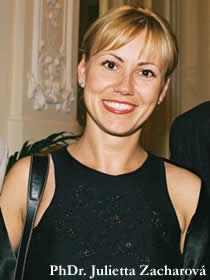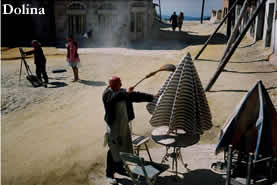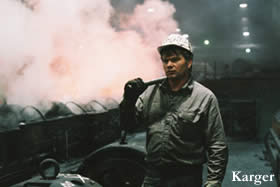 PhDr. Julietta Zacharová studied German and English languages and American literature at the University of Salzburg, Austria. After moving back to her hometown, Prague, she studied film history and theory at the Faculty of Philosophy. She graduated from the Charles University with a Doctor Degree. In her final diploma work, entitled Cinematography and the State: To the Genesis of the Cinematographical Legislation until the Year 1918, she concentrated on early history of cinema in Austrian-Hungarian Monarchy, focusing on the first laws applied to film business.
PhDr. Julietta Zacharová studied German and English languages and American literature at the University of Salzburg, Austria. After moving back to her hometown, Prague, she studied film history and theory at the Faculty of Philosophy. She graduated from the Charles University with a Doctor Degree. In her final diploma work, entitled Cinematography and the State: To the Genesis of the Cinematographical Legislation until the Year 1918, she concentrated on early history of cinema in Austrian-Hungarian Monarchy, focusing on the first laws applied to film business.
She cooperated with Prague National Film Archive on several research projects that where dealing with the topic of early Austrian cinema history and its impact on Czech film environment in the first years of the existence of independent Czechoslovakia.
She has been active as journalist, cooperating with several Czech magazines including Film a doba, Cinepur, Labyrint, Rock a pop etc. Julietta Zacharová is a member of Czech FIPRESCI section.
She joined the team of the Karlovy Vary International Film Festival in 1995 and has been working in the Program Department since that time. Her present position at the Festival is Program Director. She has been representing the Karlovy Vary IFF at numerous festivals all around the world.
Bijan Tehran: Please tell us about the history of Karlovy Vary Film Festival.
PhDr. Julietta Zacharová: The Karlovy Vary IFF is the most important international film festival of Category A in Central and Eastern Europe. The concept of the Karlovy Vary IFF is based on the advantageous geopolitical location of the Czech Republic on the border between Eastern and Western Europe. The Karlovy Vary IFF presents annually for the first time in the Czech Republic more than 200 new films from the whole world. The festival is open to the public and is visited by thousands of young people.
the Karlovy Vary IFF is based on the advantageous geopolitical location of the Czech Republic on the border between Eastern and Western Europe. The Karlovy Vary IFF presents annually for the first time in the Czech Republic more than 200 new films from the whole world. The festival is open to the public and is visited by thousands of young people.
The Karlovy Vary IFF is one of the oldest film festivals of all time (the first year took place in 1946). For more than 40 years the festival was organized under the pressure of the political situation in socialist Czechoslovakia.  After the social changes in November 1989 the festival struggled for several years with lack of interest from the side of the state as well as public, in whose eyes it was almost irretrievably discredited In the year 1994 the organization of the festival was taken up by a new team, in the lead of which stood the well-known Czech actor JiÅ™í BartoÅ¡ka and the significant film columnist and critic Eva Zaoralová, who decided to transform the stagnant show into a film forum of international importance. Within a few years, the team of JiÅ™í BartoÅ¡ka and Eva Zaoralová managed to return to the festival the prestige and interest of both professional and lay public through its new programme as well as organizational concept.
After the social changes in November 1989 the festival struggled for several years with lack of interest from the side of the state as well as public, in whose eyes it was almost irretrievably discredited In the year 1994 the organization of the festival was taken up by a new team, in the lead of which stood the well-known Czech actor JiÅ™í BartoÅ¡ka and the significant film columnist and critic Eva Zaoralová, who decided to transform the stagnant show into a film forum of international importance. Within a few years, the team of JiÅ™í BartoÅ¡ka and Eva Zaoralová managed to return to the festival the prestige and interest of both professional and lay public through its new programme as well as organizational concept.
Bijan: How and when did you involve with the festival?
Julietta: I worked for the KVIFF for the first time in 1995; I was studying film history at the Charles University in Prague and suddenly got an offer to join the Programme Department of the Festival. I have been working for the Festival ever since.
Prague and suddenly got an offer to join the Programme Department of the Festival. I have been working for the Festival ever since.
Bijan: What are the different categories in Karlovy Vary Film Festival competitions?
Julietta: We have three main competitions for feature films, short and long documentaries and a special competition of films produced in the countries of the former Eastern bloc.
Bijan: Have international cinema a strong presence at Karlovy Vary Film Festival. How many countries are expected to participate in 2007 festival? Is there any focus on cinema of a reign, a country or an international filmmaker?  Julietta: We show films from all around the world, all continents are represented, this year we will be showing films from 59 countries. Every year, we focus on the countries of the former Eastern bloc and present films from this region in the competition entitled East of the West. This year’s program will also include the following focuses, tributes and retrospectives:
Julietta: We show films from all around the world, all continents are represented, this year we will be showing films from 59 countries. Every year, we focus on the countries of the former Eastern bloc and present films from this region in the competition entitled East of the West. This year’s program will also include the following focuses, tributes and retrospectives:
Shochiku Nouvelle Vague, New Hollywood, Tribute to William Wyler, Focus on New Italian Directors, Cinema Gallery, Treasures from the National Film Archive, The Fresh Selection – The Promising Five
Bijan: Are there any international film directors and from Latin America, Africa and Asia attending the festival? Would you please name a few.
Julietta: Sure,
Sabrina Farji – Argentina
Michael James Rowland – Australia
Min Boung-hun – Korea
Shukhrat Makhmudov – Uzbekistan
Joanna Vasquez Arong – China/Philippines
Shin Dong-il – Korea
Ariel Rotter – Argentina
Suman Ghosh – India
Gianfranco Quattrini – Argentina
Bijan: What we should look forward in 2007 festival? Any exceptional movie or new talent?
Julietta: All three competitions are definitely something the audiences should look forward to – there are several new talents – first time directors, let me mention perhaps those participating in the main competition: Elke Hauck from Germany, Bard Breien from Norway, Michael James Rowland from Australia etc.
perhaps those participating in the main competition: Elke Hauck from Germany, Bard Breien from Norway, Michael James Rowland from Australia etc.
Apart from competitions, the highlights are definitely our retrospectives, introducing precious archive prints of such films as: The Spiders I ( The Golden Lake), The Spiders II (The Brilliant’s Ship) all films from Shochiku Nouvelle Vague retrospective (brand new prints were made for the unique KVIFF presentation!): An Affair at Akitsu Spa, The Assassin, 18 Roughs, Samurai Spy, A Flame at Pier, Naked Youth, Sun’s Burial, films included into the retrospective New Hollywood: American Graffiti, Badlands, The Conversation, Harold and Maude (really valuable print made from the first negative! – rarely to be seen), The Last Picture Show, Mean Streets, The Sugarland Express, Two-Lane Blacktop
Bijan: Is there any attention to Documentary productions at the festival?
Julietta: We have a competition for short and feature-length docs and also present documentaries in other Festival section, this year e.g.: The Monastery (screened in Another View), Annie Leibovitz: Life Through a Lens (section Horizons), Czech doc Left, Right, Forward (Czech Films 2006-2007) etc.
Bijan: Please tell us about your plans for the future of the Karlovy Vary Film Festival
Julietta: We would like to maintain the high standard of our program, which brings brand new films to normal audiences as well as film professionals and journalists from all around the world, and apart from that we would also like to continue presenting films that got international recognition at other festivals as our audiences are naturally curious to see the winners of Venice, Berlinale or Cannes. We would also like to continue being a bridge between East and West – a Festival, which introduces talents from East and Central European countries to producers, buyers, distributors from the rest of the World. International guests know that in our program and also at the Panel of East and Central European projects, they will find the best what former Socialist countries can offer. This is a trend we would like to further develop.

